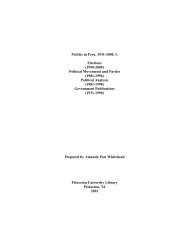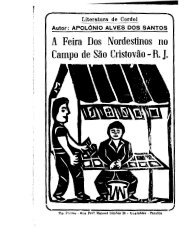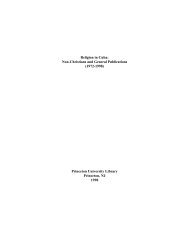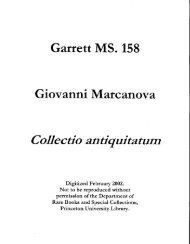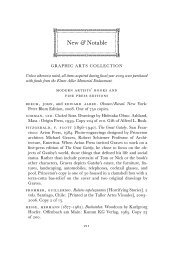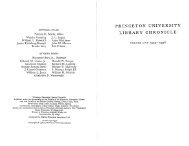Create successful ePaper yourself
Turn your PDF publications into a flip-book with our unique Google optimized e-Paper software.
tion of selected poems by Seferis in our anthology Six Poets of Modern<br />
Greece.<br />
In the decade of the 1960s, the correspondence becomes weightier,<br />
and it is shaped by a series of events that inspired more frequent<br />
exchange. Among these are Seferis’s receiving the Nobel Prize in<br />
1963, the volume of his collected poems in English translation that<br />
Sherrard and I began to work on in 1964, Seferis’s trip to the United<br />
States to receive an honorary doctorate from Princeton University<br />
in 1965, the political situation in Greece and the advent of censorship<br />
under the Colonels’ dictatorship immediately following the<br />
coup of April 1967, Seferis’s residence at the Institute for Advanced<br />
Study in Princeton in 1968 and his inner debate over becoming the<br />
conscience of his country, and, finally, the preparation during 1969<br />
of a comprehensive interview for the Paris Review series. 11<br />
The correspondence in the early 1970s is perhaps the most casual<br />
and in some ways the most personal. It includes Seferis’s urgent<br />
requests for pipe tobacco and books (one of these relating to<br />
his growing infirmity), a curious yet revealing exchange about a<br />
misunderstanding involving our mutual friend the critic Zissimos<br />
Lorenzatos, and a moving letter from Maro Seferis following her<br />
husband’s death. My remarks will now focus specifically on the<br />
letters that are gathered here, and the commentary will be arranged<br />
chronologically and in keeping with the themes and preoccupations<br />
that I have just outlined.<br />
1951–1952<br />
In 1951 I was a twenty-three-year-old graduate student who had<br />
enrolled at Oxford to specialize in English literature but had begun<br />
instead to take my first awkward steps into what was for me<br />
the totally new field of Modern Greek literature, steps that eventually<br />
carried me through a D. Phil. dissertation on Anglo-American<br />
influences in the poetry of Cavafy and Seferis. It was Constantine<br />
Trypanis, then the Bywater and Sotheby Professor of Byzantine<br />
and Modern Greek at Oxford, and George Savidis, then a student<br />
11 My interview with Seferis, recorded in his apartment at the Institute for Advanced Study,<br />
was first published in the Fall 1970 issue of the Paris Review, reissued in their Writers at Work,<br />
Fourth Series, edited by George Plimpton (New York: Viking Press, 1976), and included as a<br />
“Postscript” to my collection of essays, Modern Greek Poetry: Voice and Myth (Princeton: Princeton<br />
University Press, 1983).<br />
369








